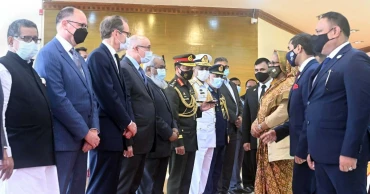International Relations
New Zealand's Ardern has many possibilities for a second act
When Jacinda Ardern announced this week she was stepping down as New Zealand's prime minister, speculation began almost immediately about what she might do for a second act.
When she leaves, she will have accumulated 15 years experience as a lawmaker and five-and-a-half years as leader. She will also be just 42 years old. Observers say she has all sorts of career possibilities open to her.
Ardern said she was leaving the job because she no longer has “enough in the tank to do it justice” and has no immediate plans for her own future other than to spend more time with her fiancé and 4-year-old daughter.
Read more: New Zealand's Ardern, an icon to many, to step down
“I’ll have to admit I slept well for the first time in a long time last night," Ardern told reporters Friday, adding that she felt both sadness and relief.
Stephen Hoadley, an assistant professor of politics and international relations at the University of Auckland, said he couldn't imagine Ardern would remain at home over the long term, given her energy and skills.
“She has the potential, she has the ability, she has the profile, she has the acceptability to do a whole lot of things," Hoadley said. “Give her a few weeks to rest up, and to refill the tank, to use her phrase. But I would imagine by the end of this year, she’ll be off and running on a whole new career line.”
Hoadley pointed to the career path of Helen Clark, another former New Zealand prime minister who went on to become a top administrator at the U.N., leading the development program.
“Jacinda could be tapped by any number of United Nations, or charitable, or philanthropical, or other kinds of organizations,” Hoadley said.
“There are many, many possibilities, and her profile is so high that I think she would have her pick.”
Climate Change Minister James Shaw, who first met Ardern in about 2007 and has remained friends, said he was in shock but also not wholly surprised when Ardern told him of her plans to resign.
“It's been a really intense five years,” Shaw said.
On top of a busy legislative program, Shaw said, Ardern had needed to steer the country through a series of crises, including a mass-shooting at two Christchurch mosques that left 51 people dead, a volcanic eruption that killed 22, and the coronavirus pandemic.
On top of that, Ardern also bore the brunt of a growing number of threats, Shaw said, and a toxic, misogynistic online culture that had grown worse in recent years.
Read more: New Zealand PM Jacinda Ardern to leave office next month, sets October election
“What I hope is that she can get some time at the beach with her family, uninterrupted, for a while,” Shaw said.
He said he believes Ardern when she says she doesn’t yet have firm plans for the future.
“I think she could do pretty much whatever she wants from this point,” Shaw said.
“Jacinda is one of the most selfless, determined, publicly-minded people I have ever met," Shaw added. "So I would imagine that whatever it is, it will be in the public interest.”
3 years ago
Dhaka-Washington: A thaw in the offing?
While the political chessboard sets itself at home ahead of the run-up to the next elections - for which a fortnight’s window spanning the last week of 2023 and the first of 2024 has now officially been disclosed by the Election Commission - Sheikh Hasina’s government seems to smell more fertile ground overseas to get some points on the board.
Of course September always has the flavour of international relations about it, given its permanent slot for UNGA Week. Prime Minister Sheikh Hasina spent barely a week in the country between returning from the extreme scrutiny of a bilateral summit in India to jetting off again for New York City (via farewell to Queen Elizabeth) for the annual meet of the international family of nations. Even so, it proved a busy, as well as telling, even fruitful period for the premier.
Read:Buckingham Palace calling: King Charles thanks PM Hasina, wishes Bangladeshis well
Although ostensibly this visit will be to the UN, the reality is lost on no one that this will be the first time Prime Minister Hasina will be setting foot in the US since an apparent strain in ties caused by the Biden Administration’s sanctions imposed against RAB and seven of its current and former top officials, including the current chief of police, Benazir Ahmed, last December 10 - International Human Rights Day. Even IGP Benazir’s recent visit, thanks to a UN invite for which the US allows certain exemptions to its own policies, drew great interest among Bangladeshis both at home and abroad. By and large it passed without incident. The Hasina visit is shaping up to be more significant.
This was evidenced by US Ambassador to Bangladesh Peter Haas seeking out an audience with the premier during her short stay in Dhaka. When an American envoy moves with such urgency, you can safely conclude something concrete is afoot. Interestingly, the US embassy’s statement following the meeting had no mention, not even as afterthought, of ‘human rights’ - on which the two sides haven’t seen eye-to-eye since President Biden took the reins in Washington. Rather, it spoke in glowing terms of ‘shared achievements over the 50 years of positive bilateral relations’ and setting the stage for the next fifty.
Read: Your democracy is for you to develop: Doraiswami
The range of issues discussed at the meeting included cooperation in economic development, security, climate change, Rohingya refugee assistance, and COVID-19, according to Ambassador Haas himself. While on the one hand there was the reiteration of US cooperation, particularly its remarkable contribution of vaccines (88 million doses) to Bangladesh during the pandemic, on the other there was acknowledgement of Bangladesh’s own achievements, including “remarkable economic progress, its leadership on climate change, its generosity in sheltering Rohingya refugees, and its tremendous contribution to global peacekeeping operations.”
The clincher came with the announcement of a “ministerial-level special session” of the two countries, along with other stakeholders, to be held on the sidelines of the UNGA. Word in the diplomatic quarter of Dhaka was that it was all about the signing of two preliminary defence deals - pretty basic ones that only set the grounds for defence purchases from American manufacturers. But reading the tea leaves, you couldn’t help but feel a more significant breakthrough might be in the offing.
Read UNGA lauds Bangladesh’s leadership in promoting culture of peace
3 years ago
China, Russia stress non-interference in countries' internal affairs
China and Russia said Thursday that the principle of non-interference in other countries' internal affairs, one of the basic norms governing international relations, should be upheld.
5 years ago
Water diplomacy can help bolster regional cooperation: Webinar
Civil society organisations (CSOs) can play a critical role in broadening the meaning of water through the inclusion of cultural, gender, ecological, and psychological aspects, says an international relations expert.
5 years ago







